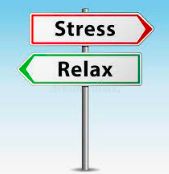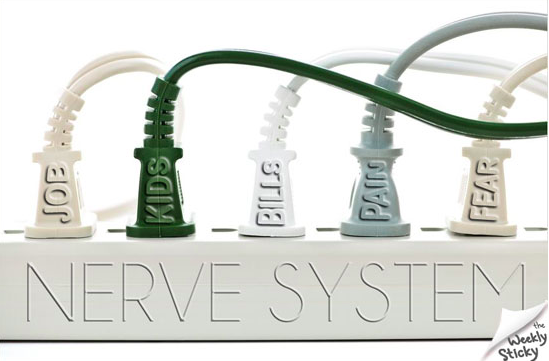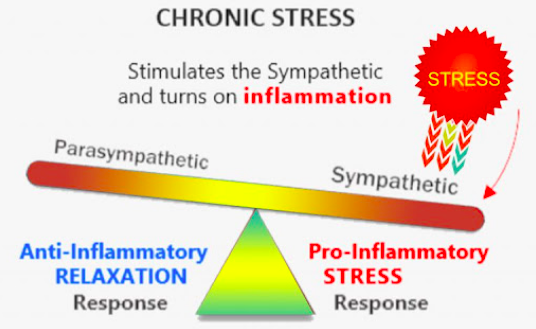Between our usual rushing around, endless to-do lists, excessive screen time, constant sitting, poor diets and environmental toxins, throw in COVID lockdowns, its associated financial pressures, social isolation and general sense of uncertainty and stress seems to be a hard thing to avoid at the moment.
So, let’s talk about stress, how it impacts your health and most importantly what you can do about it.
Stress…it’s not all bad

Stress and our body’s responses to stress are normal, natural, and necessary – stress triggers resilience, adaptation and growth. Our ability to adapt to stress in our environment determines whether it becomes positive stress (eustress) or negative stress (distress).
Acute stress has an important and beneficial role to play when it comes in short bursts – it is designed to keep you alive, it helps you focus on problems and in making important decisions. However, constant stress is not healthy. It affects the normal function of your nervous system and can eventually have serious effects on your physical and mental health.
Let’s do a quick stress check – try to lower your shoulders.
If you could – if your shoulders were tense – your body is in defence physiology. You are ready to defend yourself against attack but you aren’t in danger, you are sitting reading this article. Keeping your shoulders raised is just one clue you are “stressed out”.
Other signs of chronic stress include:
- tight neck or shoulder muscles
- difficulty sleeping or insomnia
- fatigue or low energy
- regular headaches
- difficulty losing weight
- digestive issues
- irritable, tense or worried most of the time
- anxiety or depression
- poor concentration or forgetfulness
- sensitivity to light or sound
- reduced sex drive
- trouble regulating temperature
- teeth grinding or jaw clenching
To understand stress and the impact of chronic stress on our health we need to understand what normal health is. When we think about health, we know that it is about how we function, not how we feel. By definition health is all encompassing; it is a state of optimal physical, mental and social well-being, not merely the absence of symptoms or disease.
Stress and your Nervous System
So, what controls the function of our body? Our nervous system does! Our nervous system, which comprises our brain, spinal cord and nerve network, controls and coordinates the function of every cell, tissue, muscle and organ in our bodies. It is our nervous system that is responsible for processing and filtering all of the stresses that we are exposed to.

When you are under any kind of stress – life-threatening or just irritating – your body is on high alert. Digestion slows as blood is diverted you your brain and muscles. Your thyroid and adrenal glands are activated to provide extra energy ready to be used. Your heart rate increases, pupils dilate and all our senses are switched on, even our posture can change into a forward-leaning position, like we are ready to run or fight. Your overall physiology is prepared to help you survive.
This ‘fight or flight’ response is driven by the sympathetic nervous system. Bursts of sympathetic activity are amazing – it is what causes us to get excited and prepares us to fight or run when stresses occur. This all happens in a split second!
The parasympathetic nervous system or ‘rest and digest’ system is what brings us back to balance after a sympathetic burst. It stimulates digestion, rest, repair, growth and reproduction.
Sympathetic Dominance…what is that?
Stress from an emergency situation is usually over in a short time. However prolonged stress keeps your body in ‘fight or flight’ physiology 24 hours a day whether you are awake or asleep. We need time to adapt and recover from stress and the bigger or longer the stress, the more rest and recovery you will require.

Given the current climate, many of us are living in a constant state of sympathetic overload which can limit our ability to adapt to the everyday stresses in our lives. Eventually, your body becomes exhausted and normal repair and healing processes are put on “hold.” This creates state that is often referred to as Sympathetic Dominance. It can impact your digestion, reproduction, blood sugar, immunity, emotional capacity and mental health.
How Chiropractic can Help the Stress Response?
Fortunately, Chiropractors work closely with the nervous system through the art of the chiropractic adjustment. Many people are unaware that the upper neck, hips and pelvis are home to parasympathetic nervous system. Chiropractic adjustments can influence these areas and ease the body’s stress patterns. When you keep your nervous system functioning at its optimum, your body is better able to withstand the effects of everyday stress and resist dis-ease. Chiropractic care including posture advice and exercises will help ease the effects of chronic stress.
Other Tips to Calm your Nervous System during Stress
The good news is there are some simple things you can add to your typical day to help to combat the sympathetic dominance you might be experiencing.
- Low intensity exercise like walking, swimming, yoga or Pilates
- Daily use of a posture pole – combats forward head carriage and rounded shoulders that impacts breathing and digestion.
- Reducing light and sound input – limit screen time, use night shift on your phone, wear red light glasses and turn screens off within an hour or so of bedtime to aid sleep.
- Time in nature – walk in the bush or on the beach, ride a bike or throw a ball with the kids.
- Meditation or mindfulness exercises – can clear the mind and slow the heart rate
- Deep diaphragmatic breathing exercises – will help normalise your breathing rhythm and move towards a parasympathetic state.
- Take an Epsom salts bath, burn lavender oil or drink herbal tea
- Sleep in a cool environment
- Be kind to yourself – set boundaries and prioritise “you time”. Putting pressure on yourself is just another perceived threat.
Managing stress can be difficult but it doesn’t have to dominate your life. As mentioned earlier, we need stress to grow and thrive in life. Learning how to recognise stress in your body and having simple strategies you can implement will allow you to deal with stress in a healthy, positive way.
Please feel free to contact us to discuss how we might be able to help you or if you need any further guidance.
